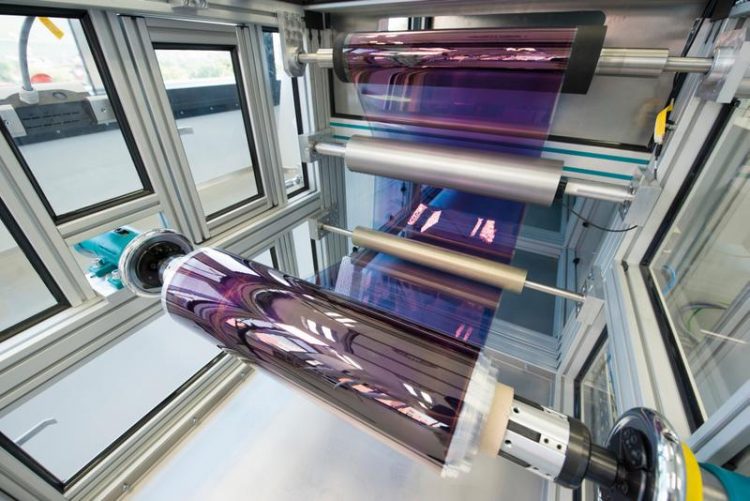Rapid transfer from lab to roll – continuous coating on the pilot scale

Electrochromic coating, applied under clean room conditions on the new roll-to-roll coating plant at Fraunhofer ISC K. Dobberke for Fraunhofer ISC
Functional coatings are an ideal way to provide products with new properties by using just a minimum of extra material.
Fraunhofer ISC develops customized advanced coatings, e. g. based on ORMOCER®s (Trademark of Fraunhofer-Gesellschaft zur Förderung der angewandten Forschung e. V., München, in Germany), for all kinds of applications and substrates.
To implement these new materials in industrial production they must be adapted to match wet chemical coating processes on site to keep costs low.
The roll-to-roll coating plant recently established at Fraunhofer ISC is of modular design and thus allows adaptation of coating materials on pilot scale in maximum bandwith of 500 mm.
Critical material and process parameters can be tested and approved long before transferring them to the actual industrial plant.
The in-house coating unit is suitable to work with all kinds of substrates, from plastic films to metal or ceramic foils, and with all kinds of coating materials such as hybrid or organic polymers, inorganic sol-gel materials or silicon.
Application and curing processes are equally adaptable, and switching from one material system to another is fast and easy.
An extra benefit: The roll-to-roll coating plant is located in a clean room of class ISO 8 according to DIN EN ISO 14644-1. This ensures high quality, extremely faultfree coating as, e. g., required for functional or optical coatings.
So, Fraunhofer ISC has added new potential to customized coating and coating application R&D.
Media Contact
All latest news from the category: Materials Sciences
Materials management deals with the research, development, manufacturing and processing of raw and industrial materials. Key aspects here are biological and medical issues, which play an increasingly important role in this field.
innovations-report offers in-depth articles related to the development and application of materials and the structure and properties of new materials.
Newest articles

First-of-its-kind study uses remote sensing to monitor plastic debris in rivers and lakes
Remote sensing creates a cost-effective solution to monitoring plastic pollution. A first-of-its-kind study from researchers at the University of Minnesota Twin Cities shows how remote sensing can help monitor and…

Laser-based artificial neuron mimics nerve cell functions at lightning speed
With a processing speed a billion times faster than nature, chip-based laser neuron could help advance AI tasks such as pattern recognition and sequence prediction. Researchers have developed a laser-based…

Optimising the processing of plastic waste
Just one look in the yellow bin reveals a colourful jumble of different types of plastic. However, the purer and more uniform plastic waste is, the easier it is to…



